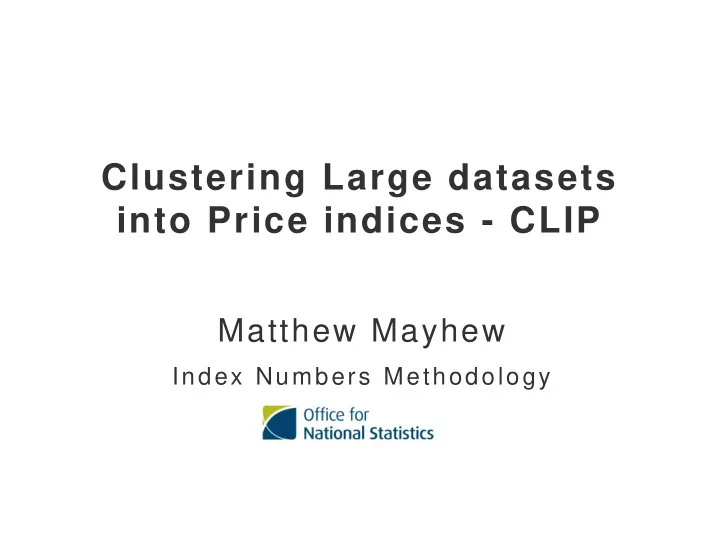

Clustering Large datasets into Price indices - CLIP Matthew Mayhew Index Numbers Methodology
Overview 01 Web Scraping 02 Overcoming the Product Churn Issue 03 Finding the groups 04 New Data and Forming the Index 05 Results 06 Future Work
Web Scraping
Motivation for web scraping • Consumer Prices Index including Owner Occupied Housing Costs (CPIH) is the most comprehensive measure of inflation in the UK • Johnson Review published in January 2015, recommended increasing the use of alternative data sources in consumer prices 4
Web scraping in ONS • Prices for 33 CPIH items from 3 online retailers • Daily collection (around 8,000 price quotes, compared to 6,800 a month for traditional collection) • Collects price, product name and discount type • Ongoing since June 2014 5
Limitations • Market coverage Large retailers only, permission, regional variation? • High product churn Traditional methods struggle • Only prices not expenditure What do people actually buy? • Technological difficulties Scraper breaks, time and cost 6
Product Churn • Product Churn is the process of products leaving and/or entering the sample. • This can either be: • Product goes out of stock, temporally leaves the sample, • Product is restocked, and reenters the sample, • Product is discontinued and permanently leaves the sample, • Product is new to the market • Products being rebranded
Product Churn – Example
Product Churn - Apples
Product Churn - Strawberries
Product Churn - Tea
Product Churn – Red Wine
Overcoming the Product Churn Issue
Problems due to Product Churn • With long datasets there is minimal chance of product being observed in every period, especially and high frequencies • Causes problems with tradition methods
Possible Solutions • Impute the missing prices in the appropriate period • ITRYGEKS • Adjust for the change in quality due to the change in products on the market • FEWS • Track groups of products over time • CLIP
Why track groups not products? • Consumers have preferences. • Preferences might be product specific, i.e. Product A ≺ Product B • • Preferences might be characteristic specific instead Characteristic 1 ≺ Characteristic 2 •
Why track groups not products? • Therefore there might be a group of products who’s have the consumer’s preferred characteristics. • The consumer would be indifferent to those products with their preferred characteristics • This group is what is tracked over time
Finding the groups
How to find these groups? • Usually the preferences would be determined by finding utility functions and maximising under a budget constraint. • Utility functions can’t be calculated with web scraped data – lacking quantity information
Groups by clustering • Groups are instead found by clustering the products • Clusters are found using the Mean Shift algorithm • Mean Shift was used as no a priori choices about cluster shapes and number of clusters
Forming Clusters
Characteristics used to form clusters • Product Name • Store • Offer • Price
Clustering - Tea
Clustering - Tea
Price Distributions
Clustering - Tea
New Data and Forming the Index
What to do with new data? • Solution 1: Recluster the data • Problem completely new clusters will be found • Solution 2: Assign Data to Clusters • This is done using a decision tree
Assigning Data • The decision tree finds the underlying rules that make up the cluster. • Price is removed as a characteristic when finding the rules. • In subsequent months when new data is collect the products are the classified using this tree • The product mix in each cluster will vary but the cluster itself is the same
Decision Tree Characteristics: Product Number = 37 Store = Tesco Offer = NA
Forming the Index • The price for a specific cluster is calculated as the geometric mean of the products in that cluster. • The price for that cluster is then compared to the price for that cluster in the base month.
Price Relatives Per Cluster
Aggregating over cluster • The Price relatives are then aggregated over clusters to form the item index. • These are weighted together with the following weights: • So for this Tea Data w 0 =0.61, w 1 =0.22 and w 2 =0.17
Tea CLIP
Results
Apples
Strawberries
Tea
Red Wine
Future Work
Assessing against approach to Index Numbers • Assessed against the Test/Axiomatic approach only fails the identity, time reversal and Price Bounce tests (Note: FEWS does as well) • To do: • Economic Approach • Statistical Approach
Test Assumptions about Substitution • Do consumers substitute within clusters? • Do consumers substitute between clusters?
Clothing and other forms • CLIP might be more suited to Clothing Items • ONS is to release research into this • Testing a geometrically aggregated CLIP as well as other variants of the index
Men’s Jeans
Women’s coats
More Information • More information on the CLIP along with more results can be found on the Office For National Statistics website. • https://www.ons.gov.uk/economy/inflationandpricein dices/articles/researchindicesusingwebscrapedprice data/clusteringlargedatasetsintopriceindicesclip
Questions? • Contact Details • Matthew.mayhew@ons.gov.uk • methodology@ons.gov.uk • For CPIH enquiries please contact • CPI@ons.gov.uk
Recommend
More recommend